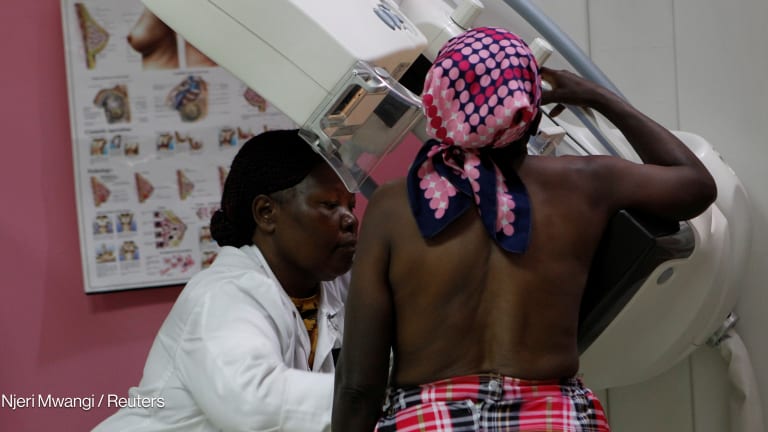
Lung cancer is the leading cause of cancer death worldwide, accounting for an estimated 2.5 million diagnoses and 1.8 million deaths in 2022. Low- and middle-income countries, or LMICs, bear the greatest disease burden, accounting for almost 70% of lung cancer deaths globally. As the incidence of lung cancer continues to rise, momentum has been building throughout the lung cancer community to address the growing global burden of the disease, including through a series of collaborative multisector discussions on how we can inject urgency into advocacy efforts for reducing mortality through early detection.
I was fortunate to participate in one such discussion — “Saving Lives from Lung Cancer” — on the sidelines of the 77th session of the World Health Assembly in May. I represented the Union for International Cancer Control, or UICC, as the event’s co-host, and was joined by representatives from ministries of health, the World Health Organization, and leading organizations in cancer policy and advocacy, to share knowledge and best practices on early detection of lung cancer.
From a lively exchange of ideas, three key areas emerged requiring focused effort:
1. Visible collaboration and advocacy to drive prioritization and action
Participants agreed that joint global leadership is important for urging governments to prioritize initiatives that ensure earlier diagnosis and treatment of lung cancer — a disease that has been overlooked in global health, despite its high prevalence and mortality.

On behalf of UICC, my colleague Yannick Romero highlighted the progress made so far in driving joint global action on lung cancer. For example, in 2021, the Lung Ambition Alliance, in partnership with the World Economic Forum, created a global collaboration — the Lung Cancer Collaboration, or LCC — which brings together government and health care leaders, high-level NGO representatives, and industry, to drive multisector collaboration to transform outcomes in lung cancer. Over 30 organizations worldwide contribute to LCC, including UICC (the LCC secretariat) and the International Agency for Research on Cancer, or IARC.
The need for joint global action was further underlined by the representative from WHO, who referenced the joint workplace between IARC and WHO, alongside LCC, to produce stratified recommendations to address both primary and secondary prevention of lung cancer and the significant burden of the disease.
2. Bottom-up advocacy in countries to drive urgency for policy change
Representatives from the United Kingdom, Australia, and Egypt presented learnings from their programs to establish lung cancer screening. The U.K. screening program was established in 2023 following a pilot project. Data showed the clear benefits that targeted lung cancer screening can bring, with the proportion of people diagnosed at stages 1 and 2 at an all-time high — 76%. Importantly, the U.K. showed significant improvements in early diagnosis in communities with lower socioeconomic status that had been specifically targeted through the program.
The U.K., Australian, and Egyptian representatives highlighted the vital role of bottom-up advocacy from clinical, patient, and academic voices in challenging stigma, generating evidence, demonstrating cost-benefit, and building the political will to invest in screening and early diagnosis.
To support bottom-up advocacy approaches, the event also marked the launch of the Saving Lives from Lung Cancer platform, an advocacy tool sponsored by AstraZeneca, to highlight to policymakers the opportunity for saving lives through early detection. The tool estimates the number of additional people who could survive at least five years following a lung cancer diagnosis through the introduction of targeted lung cancer screening. Marq Marquez, senior director of International Oncology Corporate Affairs at AstraZeneca, explained that, according to the projections, implementing early lung cancer screening programs and ensuring timely intervention of treatment could increase the five-year survival rate of patients by 73% (see Explainer) in the first year of implementation across the geographies studied.
3. Making an investment case and building pathways that support better outcomes after early diagnosis
Progress on early detection and treatment of lung cancer also requires a thorough understanding of existing evidence and careful evaluation of how to implement best practices. This is particularly true in the case of lung cancer screening by low-dose computed tomography, or LDCT, a small dose of X-ray that can identify small lung abnormalities. The Lung Cancer Policy Network, or LCPN, highlighted the tools and resources they have developed, such as their implementation toolkit, to support local advocates and governments in building and implementing lung cancer screening programs based on LDCT.
“In 2021, following a surge of evidence supporting lung cancer screening, we seized the opportunity,” explained Suzanne Wait, managing director of the Health Policy Partnership. “Together with partners from around the world, we established the LCPN to bring together the entire lung cancer community, to create and share resources that could be replicated in different countries, to create a forum for exchange and to drive concrete change that will improve the lives of people living with lung cancer around the world.”
Representatives from industry, UICC, and WHO spoke about existing technologies that support increased capacity for early detection in health systems. “It’s essential that we foster multi-sector partnerships to further identify and deploy technologies to support early diagnosis of lung cancer,” commented Ti Hwei How, vice president of international oncology at AstraZeneca. “Examples include the use of liquid biopsy, or AI-enabled chest x-rays to detect potential lung nodule malignancies or as a tool for risk modeling. This allows for more equitable access to screening and early detection across high-risk populations.”
Moreover, governments can take valuable lessons from successful screening programs for other cancers and diseases. The representative from Egypt’s Ministry of Health explained how the country had drawn on its experience in population screening for breast and colon cancer, and hepatitis C, to make progress toward screening for lung cancer.
All agreed that countries must take steps to accelerate detection, diagnosis and access to treatment for lung cancer, with the U.K. representative reinforcing the importance of timely action due to the highly aggressive nature of the disease. However, those at the event were keen to add that early detection alone will not be sufficient for saving lives. Clear pathways to diagnosis, treatment, and follow-up care are needed so that patients can be supported to achieve better outcomes.
Continuing the discussion
The increased global focus on lung cancer is encouraging, and action in countries such as the U.K., Australia, and Egypt should be celebrated. However, a lot more work is needed to tackle the huge burden of lung cancer. Attendees at the event highlighted some considerations that countries may need to address:
• In LMICs that face challenges with the introduction of new screening technologies, the use of AI to triage patients for screening based on chest X-ray results can support clinicians in diagnosing lung cancer earlier.
• Risk stratification should be tailored to local requirements. For example, some countries may need to consider targeting non-smokers who have other risk factors, including genetic or environmental risk factors such as high air pollution levels.
• Globally valid key performance indicators in lung cancer — such as those developed through the Global Breast Cancer Initiative — may support a global consensus for action on lung cancer and provide tools for driving and measuring progress and accountability at a national level.
Turning talk to action
As I reflect on a fruitful discussion and look ahead to the United Nations high-level neeting on noncommunicable diseases, or NCDs, it is clear to me that there are opportunities to further elevate the importance of early lung cancer detection and care pathway redesign.
At UICC, we urge governments and policymakers around the world to act now, to continue global collaborations that drive forward global action, and to prioritize lung cancer early detection in NCD and cancer control activities. By doing so, we can improve outcomes for people with lung cancer and, ultimately, save lives.
Author’s note:
Explainer: These figures were calculated using the average number of potential lives that could be saved in the first year across the seven international geographies and six screening scenarios included in the Saving Lives from Lung Cancer platform. Visit the platform to find out more https://www.lungcancerlivessaved.com/.








